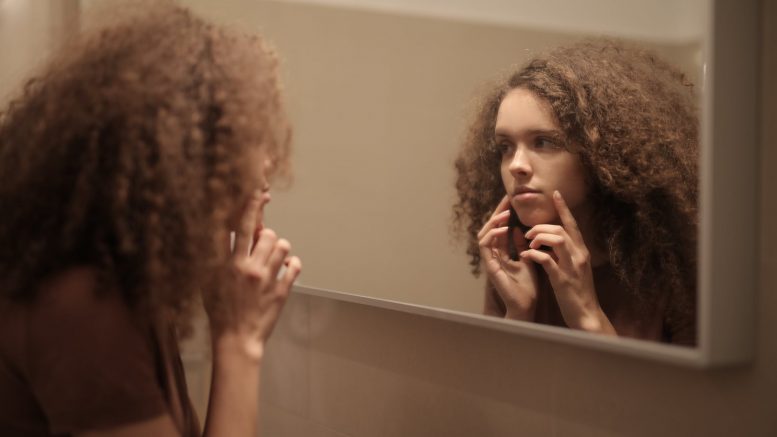Skin is an important feature which can determine one’s confidence and self-esteem, but with the coronavirus outbreak, many people have had to kiss their clear complexions goodbye.
The obligation of having to wear facemasks at all times when out in public has resulted in many people getting breakouts in the area which the mask covers. The difficulties to maintain clear skin have also led to numerous people taking their frustrations online.
Tweet upon tweet can be found in which people have complained about their maskne and even shared images to show their irritated skin as a result of wearing a face mask for long periods of time.
My maskne is out of control
— nicunurselifee (@nicunurselifee) October 16, 2020
hormones and maskne fucked my skin up this week 🙁 pic.twitter.com/pxxjhcUqCh
— no moisture, just vibes ✨ (@skincarevampire) October 17, 2020
Angelica Ramirez, 22, is one of the Twitter users who have shared their thoughts of frustration with the world. She tells Voice of London how it has “affected both my confidence and my self-esteem, as I cannot go out without wearing makeup and feel ugly without it.”
I’m going to order myself a silk mask bc I’m tired of having maskne 🤦🏻♀️
— geli (@gelica_ramirez) October 17, 2020
She also says how although she has previously suffered from acne at age 15, it later all cleared up when she turned 20 and has recently come back when starting to wear the mask earlier this year. She says how it got much worse after two months of wearing a face mask consistently.
Angelica works in healthcare which means she must wear the mask for up to eight hours every shift. When asking her how she copes with maskne, her answer is: “I stay hydrated and cleanse my face after I get home from work.”
HOW DO YOU WEAR A MASK AND NOT GET MASKNE I NEED HELPPP😖
— samantha fregoso (@sam_fregoso) October 12, 2020
Similarly, 19-year-old Samantha Fregoso, another one of the users who took her frustration with maskne online, told Voice of London how maskne started for her and how she feels about it.
“I realised I started getting maskne at the beginning of June when I started working my new job because I was having to wear a mask eight hours a day. I have been affected in the past but just as my skin was starting to clear up again my acne came back from wearing a mask so often.
“Maskne has affected my confidence and my self-esteem because I feel like I want to wear a mask to hide the maskne even when I don’t have to. I also feel like I’ve been trying to cover it up with more makeup so it’s not comfortable for me to have foundation on.”
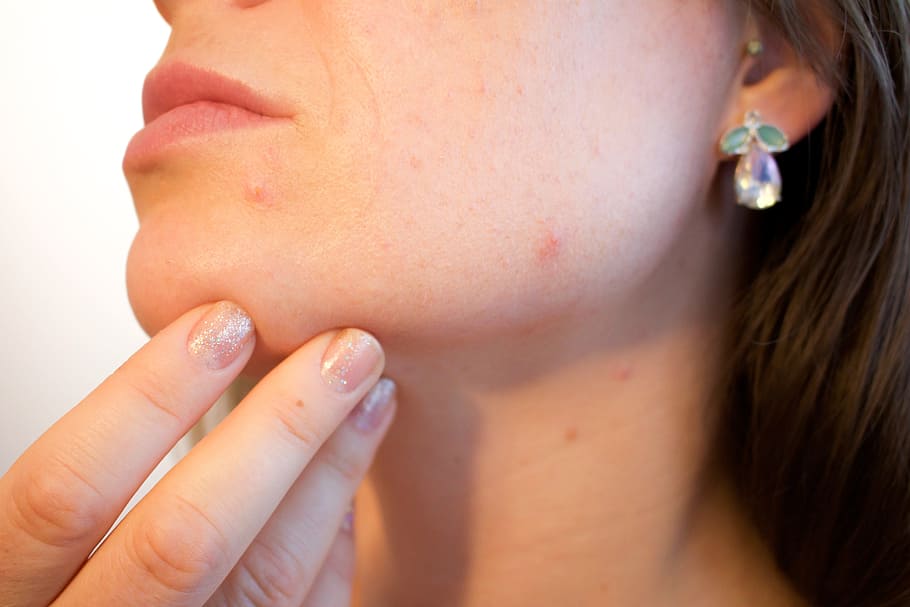
Photo by: pxfuel
But how is maskne caused and what is some expert advice on how to prevent and tackle it?
Voice of London has spoken to UK-based dermatologists on how maskne happens and what to do about breakouts caused by face masks.
Dr Adil Sheraz, Consultant and Surgical Dermatologist working at a leading hospital in London and specialist acne clinic Zapped, says that although there are no studies that have looked at maskne and most of what is being discussed is mostly observational, Acne Mechanica – the medical term for acne caused by masks or other materials – is a well-recognised phenomenon.
He quotes: “This form of acne is thought to be caused by the friction of masks on the skin and along with the increased humidity, heat and occlusion of pores the result can be breakouts of acne.”
He also comments how maskne is most common amongst younger people, although this does not exclude older age groups from getting it too.
“Acne is generally more common in younger people and I would say the majority of patients attending with such problems are under the age of 30. However, this is by no means a condition of the young and can affect any age group.”
Dr Sheraz says there are plenty of tips one can use to minimise acne spots.
Below is an infographic with all of the appropriate measures he recommends for those affected by maskne to take:
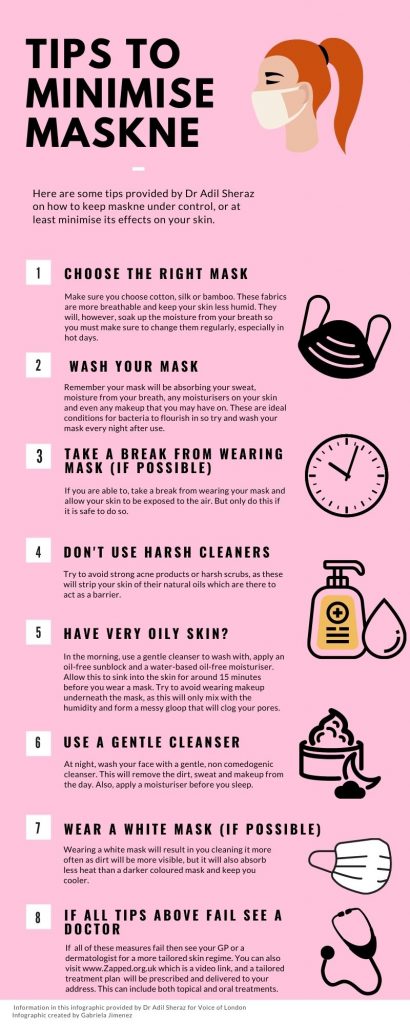
Dr Sheraz’s tips on how to control maskne. Infographic by: Gabriela Jimenez
Dr Sivanie Sewell, Consultant Dermatologist based in London and Surrey also gives some useful advice on how to prevent maskne and ways in which it could be treated.
She tells Voice of London how it is most practical for people to wear reusable, well-fitted face masks which they can wash at high temperatures, as well as to change them frequently, especially when wearing them for long periods of time, to avoid dirt from entering pores.
“Out of all the different face coverings that are out there, I tend to find that the most practical ones are the ones that you can chuck in the washing machine. This is because, firstly, people are more likely to wash it, and secondly, it is easier to wash it more effectively if washed with detergent at about 60 degrees.
“Also, wearing a well-fitted face mask is very important, because if you don’t, then what you get is friction that can occur in various places and that can contribute to maskne.”

Photo by: Flickr
When it comes to skincare, Dr Sewell recommends maskne sufferers to try some over-the-counter products such as benzoyl peroxide gel before seeking help from a medical professional, as well as to wear makeup that won’t clog pores, if wearing any.
“It is best not to wear makeup underneath your face mask because makeup can clog up your pores and cause maskne.
“However, if you are, what I would suggest is to use a thin layer only, particularly where you’ve got your face mask covering the area, as well as it is also very important to choose makeup that is non-comedogenic.”
She also advises people to use certain anti-blemish ingredients such as salicylic acid correctly. Although they can be helpful, they can also irritate the skin if not used right.
She urges people to avoid things including retinoids if used for the first time, as well as chemical peels as these could irritate the skin too.
“Ingredients that could worsen maskne are those that generally increase cell turnaround, which can irritate the skin if not used correctly.
“So, things like retinoids and chemical peels, some acids like salicylic acid can make maskne worse if not used correctly, which is why, when introducing these products, it is important that you introduce them slowly and correctly, and not use too high a percentage.”
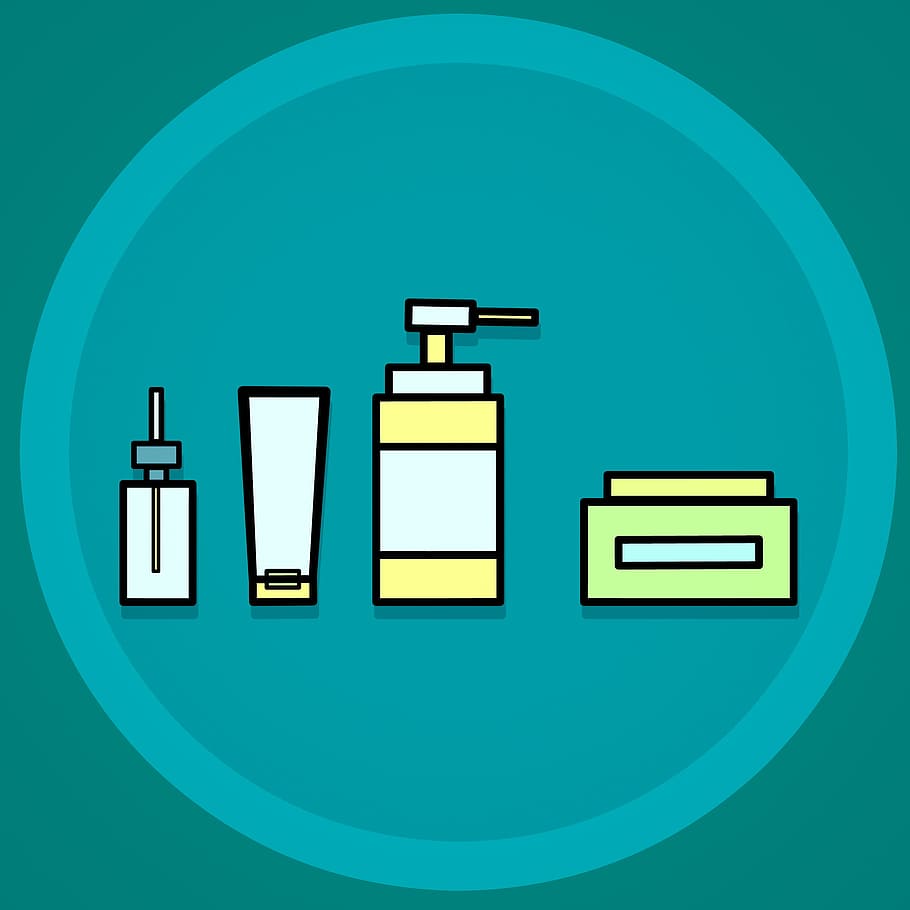
Photo by: pxfuel
Is it really maskne?
People can often be quick to assume that they have maskne when they notice blemishes on their mask area. However, this might not be the case.
Dr Sewell advises for those who notice their spots have an odd appearance to seek help from a dermatologist or GP, as this could lead to a completely different diagnosis.
“Face mask use has also caused a surge in skin rashes and skin conditions other than maskne, for example, fungal skin conditions and so many others.
“So, if it is a typical spot or typical blemishes then, by all means, do treat it as maskne. But if it isn’t or doesn’t look quite right I will always say see a dermatologist (or a GP if you haven’t got access to a dermatologist), for an assessment and a diagnosis because the treatment can be hugely different.”

Photo by: Edmond Dantès | Pexels
What to do when it comes to confidence and self-esteem issues caused by maskne
Dr Sheraz recommends people to talk about the situation as a beneficial way to manage their issues with self-esteem.
“Acne can have a huge psychosocial impact on one’s life and mental health. And studies have shown that the extent of the disease does not necessarily correlate with the degree of impact it has on mental health. So a patient could have very mild diseases and it could have a severe impact on their mental wellbeing.
“It is important of course to continue wearing masks, but choosing the right mask and following the advice given will help significantly. If you are really struggling with acne and problems with self-confidence, then I find talking about the issue can sometimes be of great benefit. Remember stress can also flare up acne so talking and finding coping mechanisms can be invaluable.”
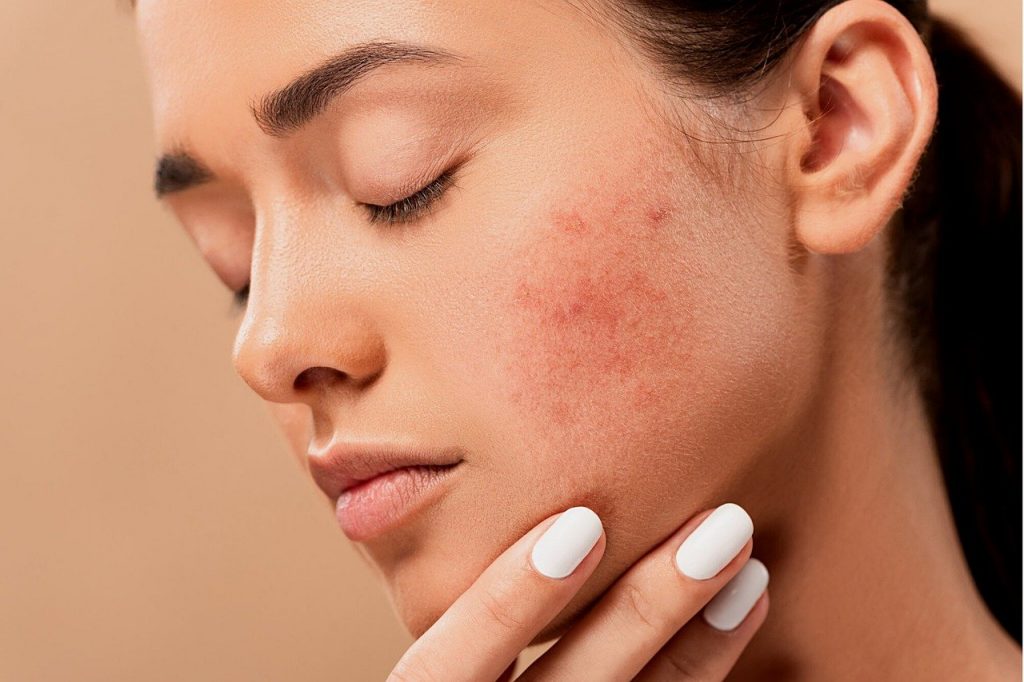
Photo by: Pixabay
Be wary of social media adverts on anti-maskne products
Ever since maskne became a big thing, companies selling anti-blemish products have come online to promote their treatments via adverts posted on sites including Instagram.
However, as confirmed by experts themselves, it is recommendable for people to be wary of what they purchase, as numerous people seem to be jumping on a bandwagon, capitalising the fact that maskne is on the rise.
Dermatologists including Dr Sewell mention that, generally, the things that truly help are often the advice provided by dermatologists themselves, as well as keeping a simple skincare routine avoiding complex or harsh ingredients.
She also adds that if the products advertised are salicylic acid-based or benzoyl peroxide-based products, as well as non-comedogenic and gentle, then it should be safe to use them.
Words and infographic: Gabriela Jimenez | Subbing: Sam Tabahriti

